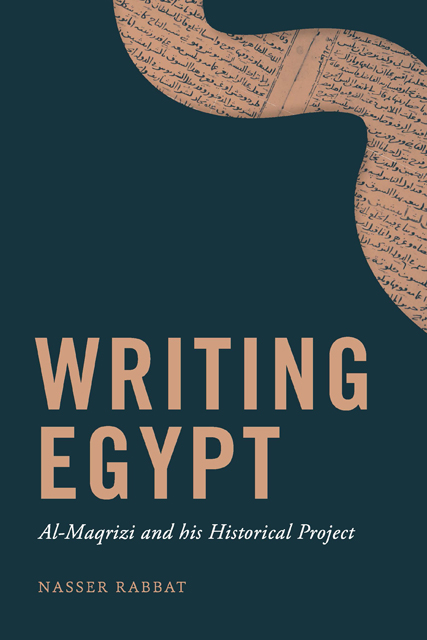Book contents
- Frontmatter
- Contents
- Preface
- List of Short References to Frequently Cited Primary Sources
- List of Abbreviations
- Notes on Transcription and Dates
- Introduction: A Singular Mamluk Historian
- Part 1 The Life of al-Maqrizi
- Part 2 The Writings of al-Maqrizi
- Part 3 The Afterlife of al-Maqrizi’s Writing
- In the Guise of a Conclusion: Becoming the Greatest Historian of Egypt
- Bibliography
- Index of Books Cited in the Text
- General Index
Introduction: A Singular Mamluk Historian
Published online by Cambridge University Press: 02 June 2023
- Frontmatter
- Contents
- Preface
- List of Short References to Frequently Cited Primary Sources
- List of Abbreviations
- Notes on Transcription and Dates
- Introduction: A Singular Mamluk Historian
- Part 1 The Life of al-Maqrizi
- Part 2 The Writings of al-Maqrizi
- Part 3 The Afterlife of al-Maqrizi’s Writing
- In the Guise of a Conclusion: Becoming the Greatest Historian of Egypt
- Bibliography
- Index of Books Cited in the Text
- General Index
Summary
Sometime in late 1413, Taqiyy al-Din Ahmad ibn ‘Ali al-Maqrizi (1364–1442), a pious Egyptian scholar who had recently returned to Cairo from a long stay in Damascus, suffered what would appear to us today as a severe mid-life crisis. He had spent the previous twenty-six years of his life trying to navigate the treacherous waters of clientage in the pursuit of employment in the state administration or the religious establishment. This quest had left him both disillusioned and disgusted with the whole process of cultivating benefactors and overcoming rivals in the utterly corrupt and shifty Mamluk backstage politics. He had begun to contemplate a way out a few years earlier, but was still beholden to his circle of patrons and to the hope of attaining an office worthy of his knowledge and expertise. The momentous events of that year, however, gravely diminished both prospects. The sultan he had last served in an official capacity had been killed. His most powerful patron at court was executed a few months later. A clique of rising administrators tried to incriminate him after his patron’s downfall. Desolate and indignant, he finally withdrew from the protracted and ultimately futile rat race. He retired to his family home in a venerable section of Cairo, where he spent the remainder of his life, thirty years in all, in almost total seclusion, except for infrequent visits to his fellow scholars and students and a number of extended sojourns to Mecca (mujawarat), where he seems to have found solace and scholarly recognition.
In his retreat, al-Maqrizi dedicated his time to studying, writing, and teaching history with a select group of students. His only companion in the house he inherited from his maternal grandfather was his daughter Fatima, whom he would lose in 1423 to the plague, after having lost the other members of his family earlier. He seems to have led a rather meager life with no steady employment or secure source of income. We know of only occasional, half-hearted, and mostly unsuccessful attempts at obtaining patronage and monetary rewards for some of his short treatises composed by commission. The outcome of his thirty-year labors, however, was an outstanding series of books and essays that aim to capture everything known about the history and geography of Egypt and the lives of its noteworthy citizens from the beginning of Islam up until his own time.
- Type
- Chapter
- Information
- Writing EgyptAl-Maqrizi and his Historical Project, pp. 1 - 8Publisher: Edinburgh University PressPrint publication year: 2023



